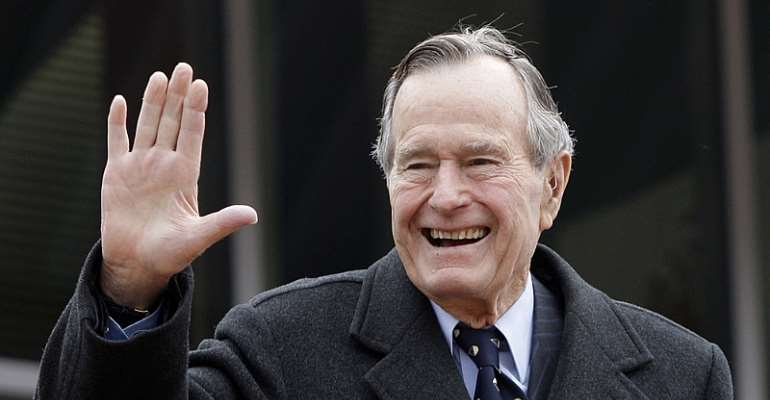Remembering George Bush Senior for his politics ofthriving on chaos

George Bush Senior is dead. He is the former US President and father to George Bush the 43rdPresident of the US. George H.W. Bush has died at the age of 94. The world will mourn him but under the weight of memories. The memories of the US Presidency that thrived on chaos.Bush Senior was a very an ever trying statesmen who led the US to retain its international status in times of chaotic contradictions originating from other centers of power like Soviet Union, Cuba, Gaddafi, Sadam Hussein, Emmanuela Noriega, Deng Xiao Peng and many other voices that defied the US as nothing else but the fountain selfish politics then known as imperialism. Indeed, thinking about George Bush Senior is synonymous to thinking aboutthe scud and the patriotic missiles, the end of Berlin Wall, salvage of Kuwait, Iraq, Mandela at Robben Island and guerrilla wars in Africa- the overtones of the cold war that had held the democracies of world hostage. But all in all Bush senior graduated into a mastery of policy masking that had to see the world through the end of political and social chaos of the Cold War.
The physically towering, calm and composed George H. W. Bush was born in Massachusetts in 1924.This was immediately after the First World War.He was born in the times of great American depression. His days of childhood were precursor of what was in his store for his future; he enlisted in the US Navy as the youngest aviator,he was shot down once and spent four hours in a life raft.He married Barbara Pierce in 1945 after quitting the Militaryservice,later that year Bush began studies at Yale University; after graduation, the family moved to Texas and went into ruthless oil mining and dealing business, Bush was elected to the House of Representatives in 1966.He was also appointed ambassador to the United Nations, then to China and also as the head of the Central Intelligence Agency. He became the President of the US in 1989 after serving as vice-president under Ronald Reagan.
Bush was respected for foreign policy expertise in regard to the Cold War and multi-pronged struggle against the Soviet Union. His efforts in struggle against Soviet Union, the perceived enemy to the US, was the key factor that made him to win the ticket for presidential election. It is this recognition that made Bush to beat his Democratic opponent, Michael Dukakis, with 54 percent of the popular vote. He took office on January 20, 1989, he proclaimed in his inaugural speech that ‘the day of the dictator is over’.Through his mettle for politics of surviving the chaos and his brilliant diplomatic maneuvers, he managed to gain the trust of Soviet leader Mikhail Gorbachev. And this marked the beginning of the end of the Soviet Union.
Reading Secondary School History byProfessor Elisha Atieno Odhiambo reveals that Bush was a good supporter of German unity, but Gorbachev was not for the idea of a reunified Germany. Along with other leaders Bush worked for the execution of ‘Two-Plus-Four agreement’ that was signed in 1990 between East German, West German, Britain, France, the Soviet Union and the United States. This is the treatythat paved the way for fall of the Berlin wall, reunification of East and West German, the restoration of full German sovereignty, the retention of German NATO membership and the withdrawal of Soviet troops from Germany.
A contradiction is that Bush senior had a soft spot for freedom in Europe, but very brutal in attitude when it comes to Africa, Asia and Latin America. He ordered for the military invasion of Panama to arrest Manuel Noriega. In 1991 Bush began the gulf war on Iraq in a military exercise hehad namedOperation Desert Storm, Bush’s attack on Iraq was shamefully defeated by Sadam Hussein. However Bush believed that he had only withdrawn his armies from Iraq but not defeated. Even he went ahead to make the victory speech in which he outlined his hopes for peace in the Middle East.
Bush’s attack on Iraq was a very expensive exercise that weakened the American economy, this experience made Bush to lose the next presidential election in 1992 to Bill Clinton.Clinton’s speechesduring the campaign fulsomely faulted Bushfor the poor economy, the growing gap between rich and poor and the increasing national debt.
There is a chapter known as the White House Days in The Memoirs, a book by Laura Bush the wife to Bush Senior, which narrates that after the defeat, George Bush senior withdrew from politics and settled in Houston with his wife and six children.This is where he spent the rest of his life. That he repeatedly said he missed neither politics nor the press.
Later realizations are that the presence of Bush family in American politics did notend with Bush senior at Houston, his son George W. Bush served as governor of Texas and was himself elected to the White House in 2000. Another son, Jeb Bush, also run for Republican nomination in 2015, he lost to Donald Trump.
The Westernsociety has respect and admiration for the political and property culture of the Bush Family. Even after his life in chaotic politics Bush Senior has received the (2008) Henry Kissinger Prize in Berlin for his contribution to the trans-Atlantic partnership. Barack Obama awarded him the (2011) Presidential Medal of Freedom, this is one of the highest civilian honor in the United States.
Bush Senior had a focus on reserving American superiority through extensive expenditureon world security, the dream he did not accomplish. He only did this at expense of poverty, illiteracy, starvation, pollution, gender violence, political rot, disease and despair in Africa. He had a duty, capacity and all the machineries to step in and lift up Africa out of the social and political mire, but he did not.
Contact: Alexander Opicho - [email protected]
